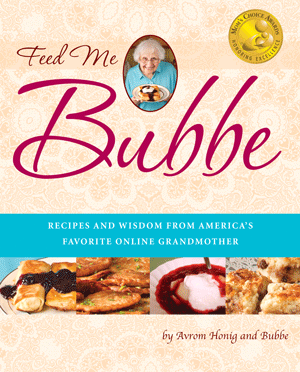614 HBI eZine
Feed Me, Bubbe
HOW ONE JEWISH GRANDMOTHER IS USING THE INTERNET TO GET AUDIENCES JAZZED ABOUT BLINTZES AND BORSCHT.
by Michelle Cove
For those who missed out on having a Jewish bubbe to teach you to bake strudel and cook chopped liver from scratch, good news—now you can have one. “Bubbe” is the host of the online kosher cooking show, Feed Me Bubbe. The idea for the show sprang from her grandson Avrom, who was looking for film experience after graduating from college. He began videotaping his grandma cooking and then posting episodes online. The show took off and has been featured on Frontline and ABC World News, as well as in the Wall Street Journal and the Boston Globe. This led Bubbe and Avrom to co-author Feed Me Bubbe: Recipes and Wisdom from America’s Favorite Online Grandmother (Running Press, 2011), which includes wisdom and 100 favorite recipes from the show. We couldn’t wait to interview this media darling along with her entrepreneurial grandson.
Feed Me Bubbe was a video show before it was a book? Where did the idea come from and how did it evolve?
Avrom: I was at the point of my career where I had finished college and was ready to move on to the next part of my life, a career in Hollywood. Well, I realized the only way that was going to happen was with a proper demo reel, so I tried to make one myself and it did not come out well. I ended up at my family table, where my dad was eating Bubbe’s food and, after listening to everything, he told me that I should tape Bubbe making food; after a good amount of speaking about this, Feed Me Bubbe was born. From there I showed up to interviews, and they didn’t ask me to travel to meet them to interview for a job; all they wanted to know was how to get their hands on Bubbe…
Bubbe: … and I thought I was going to be retired, but you do what you can to help your grandchildren.
Bubbe, I read that you worked as a full-time teller in a local bank until age 73. What inspired the career shift and how has it changed you?
I worked at the operation center of the bank. I retired at 73. Feed Me Bubbe was not a career change. Avrom needed to get a job and needed a demo reel. I wanted to help my grandson Avrom get a job. It was not supposed to be a career change, just a way to help out my grandson. It turned into more than I could have ever imagined.
Avrom, what is it like to work with your grandmother? What is your favorite recipe that she makes?
Avrom: It is a dream come true. Could I ever believe that I would get to be able to have a career in the industry that I love while sharing time with my grandmother? I mean, seriously, who saw this happening? I would never have seen this coming, and yet, it has been an amazing experience—one that I constantly look forward to.
As far as food, I never find that question fair since I always enjoy Bubbe’s food. But, if I had to choose, the first one that just came to mind is Bubbe’s Sweet and Sour Meatballs. It’s the perfect way to start a meal, as an appetizer; or, if you are hungry, you can turn it into a sub sandwich or even serve it over a plate of rice. The best part is it’s a lot of fun to make the small meatballs and get them ready to put into the sauce.
Your book has a Yiddish word of the day. Why did you decide to include this? Do you worry about this language dying out?
Bubbe: We wanted to have a book that would not only have recipes, but also encompass our video show, which is known and loved all over the world. In the video show, we have a Yiddish Word of the Day to provide a little bit more than just how to cook. This happens to be quite a favorite of our audience, and we couldn’t help but include it. There are so many Yiddish words that are used in our everyday language today. I don’t worry about Yiddish dying out today. It is less used, but there are still classes taking place. You may be familiar that there is even the Yiddish Book Center in Amherst, Massachusetts. I feel that it is important we keep Yiddish alive and not forget it completely.
Why is it important to keep traditional Jewish recipes alive in our culture?
Bubbe: I feel that it is necessary to keep our heritage and Jewish roots alive. One way is to provide traditional Jewish recipes. Jewish people live all over the world and use the food ingredients available in those areas. However, many of the basic traditional recipes can be adjusted today to be healthy and nutritional according to today’s lifestyle using the basics. This will give us traditional and family recipes as well as memories for generations to come, especially for Jewish holidays.
Bubbe, can you share with us one of your favorite recipes and the memories that it has for you? Is flavor as important to you as memory association?
Bubbe: One great recipe my mother made was strudel. We all loved it, and my mother even taught our non-Jewish neighbors how to make it for their holidays. I can picture her in my memory even today—how she made the dough into a large round circle that covered our whole kitchen table and then prepared the filling. However, like everything else it was a different time and a different era. Raising a family and working did not give me the time to duplicate my mother’s recipe. I had to find a way of making my own pastry that would take very little time and use my mother’s recipe for the filling. My children were young and liked to watch and help. They gave the recipe the name Jelly Jammies. Taste as well as memory is very important. It is something we don’t forget. Flavor is also very important, because without good flavor you don’t have a positive memory and experience, and the positive experience is what creates a memory association.
What do you say to critics who complain that Jewish holiday dishes may be delicious, but are often too unhealthy?
Bubbe: Yes, in the past, many of the ethnic recipes around the world were unhealthy, including Jewish holiday dishes. However, with the knowledge we have today of health and nutrition, I find that this statement is false. Every recipe through the generations has always been changed a little, but the basics were always there. It needs a little thinking and effort as well as knowledge to bring a recipe up to today’s health and nutritional standards. With the availability of so many healthy substitutes in food, this can easily be accomplished while still keeping the taste and the flavors for tradition, and memories for generations to come.
Michelle Cove is the editor of 614 and the director of the feature-length documentarySeeking Happily Ever After: One generation’s struggle to redefine the fairytale(www.seekinghappilyeverafter.com). She is also the author of the book Seeking Happily Ever After: How to navigate the ups and downs of being single without losing your mind (and finding lasting love along the way) (Tarcher/Penguin, 2010).





I love you, bubbe
! Your recipes are appreciated so much because we didn’t think to get them from our grandmothers, but you are the real gem! Your hints and tips come from your heart and I feel like I am invited to sit at your table and learn from you about cooking, yes – but about life and the love you show for your family and tradition. Feed me Bubbe is so much more than food!